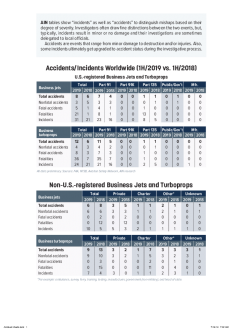The high number of fatal accidents and fatalities involving U.S.-registered turbine business airplanes in the first half of this year might set an all-time record for a six-month period, with June clearly being the deadliest 30-day time frame. According to preliminary statistics gathered by AIN, 21 people died in five business jet crashes and 36 lost their lives in eight turboprop crashes during the first half of this year. All but two of the fatal accidents occurred while operating under Part 91.
In the same six-month block last year, one died in a single business jet accident and seven perished in three turboprop mishaps. Indeed, historical data do not indicate any other first half where U.S. business jet fatalities topped 21 before the first six months of the year. However, bizjet fatalities did hit 27 in all of 2014. The last complete year in which turboprop fatalities climbed to more than 36 was in 2013.
To put this year’s numbers in context, note that 13 people are believed to have been killed in the crash of an N-numbered Bombardier Challenger 601-3A that went missing May 5 over Mexico on a charter flight. Two died in the May 22 crash of a Cessna Citation SII and the sole-occupant pilot was killed just two days later when a Citation 560 overshot its planned destination and crashed into the sea. On April 12, three were killed in the crash of a Rockwell Sabreliner. Two perished in a March 18 landing accident of an Israel Aircraft Industries Westwind 1124.
Three bizjet nonfatal mishaps recorded as accidents in the first half of 2019 included “serious injury” to a passenger when a Citation 560 encountered severe turbulence en route on June 27. On January 12, a Challenger incurred substantial damage following a runway excursion on landing, and on March 9, a Gulfstream GIV was substantially damaged when it landed about 10 feet short of the runway threshold.
June Is Busting Out All Over
Two Beech King Air takeoff accidents resulted in 21 of the fatalities involving turboprops in this year’s first half: 11 in the June 21 crash of a skydiving A90 and 10 on June 30 of a Model 350 that hit a hangar. Two more fatal accidents in the same month included a Cessna Conquest that crashed on June 10, killing the pilot and sole occupant, and the in-flight breakup on June 7 of a turboprop-converted Piper Malibu that resulted in four fatalities. In this case, IMC prevailed but the pilot was not instrument rated. A turboprop-converted Malibu was also involved in a fatal crash on February 28, killing the two people on board.
A May 13 midair between two tour aircraft took the life of one person in a de Havilland Turbine Otter and (not shown in the charts) and all five people in a piston-powered de Havilland Beaver. On January 21, the four occupants on a turbine DC-3 died when their converted twin crashed, and three died in the January 29 accident of an air ambulance King Air 200.
No non-U.S.-registered business jets or turboprops suffered any fatal accidents in the first half of this year, compared to the same period in 2018, when 12 people died in two crashes of business jets and 15 people lost their lives in three crashes by turboprops. Additionally, both the non-N-numbered jet and turboprop segments experienced fewer nonfatal accidents in the first six months of this year compared with last year.
Although there were no fatalities involving non-N-numbered business jets, there was a “serious incident” resulting in the aircraft being “written off.” On April 16, A Global 5000 departed Berlin-Schönefeld Airport on a functional check flight after having undergone heavy maintenance. The flight returned to Berlin after reaching 21,000 feet and experienced “flight control problems.” Both wing tips are said to have touched the runway on takeoff. “After inspection, substantial damage to the plane was assessed. The plane is possibly a write-off,” said investigators.
